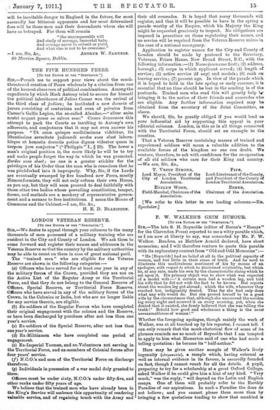THE FIVE HUNDRED PEERS.
[To THE EDITOR OF THE " SPECTATOR:]
Sue,—Permit me to support your views about the much- threatened creation of Peers wholesale by a citation from one of the keenest observers of political combinations. Among the expedients by which Mark Antony tried to secure for himself the political inheritance of Julius Caesar was the revival of the third class of judices ; he instituted a new decuria of jurors consisting of centurions and even of privates from Caesar's Gallic Legion, the so-called Alaudae,—" aliter enim nostri negant posse se salvos ease." Cicero denounces this attempt to pack the Courts as insulting to Antony's own adherents, and conjectures that it may not even answer his purpose. " Ut enim quisque sordidissimus videbitur, ita libentissime severitate judicandi sordes sues eluet labora- blique ut honestis decuriis potius dignus videatur quam in ttypem jure conjectua " (" Philippic" I., § 20). The lower a man's original position is, the more likely he will be to try and make people forget the way in which he was promoted. Sordes sues eluet ; no one is a greater stickler for the privileges of his Order than the man who is conscious that he was pitchforked into it improperly. Why, Sir, if the Lords are eventually swamped by five hundred new Peers, mostly Nonconformists, they will not only reform their own House, as you say, but they will soon proceed to deal faithfully with those other two bodies whose prevailing constitution, temper, forms, and methods are a mockery of representative govern- ment and a menace to free institutions. I mean the House of Commons and the Cabinet.—I am, Sir, &c., H. E. D. BLAXISTON.


















































 Previous page
Previous page